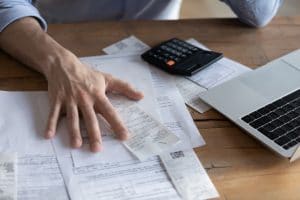
VAT-registered businesses may have to pay VAT on invoices before they receive payment for them. VAT bad debt relief can, however, allow them to reclaim VAT on unpaid invoices after six month from date of invoice.
The basics of VAT
Value-added tax (VAT) is a consumption tax placed on a product whenever value is added at each stage of the supply chain, from production to the point of sale. The amount of VAT that the consumer pays is based on the purchase price of the product. VAT is typically imposed on all goods and services that are bought and sold for personal or business use.
There are several different types of VAT systems, but the most common type is the destination-based VAT. Under this system, VAT is levied on goods and services at each stage of the supply chain, but it is only collected by the seller when the goods or services are sold to the final consumer. This type of VAT is often used in conjunction with other taxes, such as income tax or sales tax.
VAT was first introduced in France in 1954 and has since been adopted by more than 160 countries around the world. It is one of the most efficient and effective ways to raise revenue, and it also provides businesses with a number of benefits, such as reducing the need for invoicing and creating a level playing field between businesses of different sizes.
If you are a business owner, it is important to understand how VAT works.
VAT for businesses
Value Added Tax (or VAT) is a consumption tax levied on most goods and services sold in the European Union (EU).
VAT is levied at each stage of the production process, with businesses able to claim back any VAT paid on goods and services used for business purposes.
For businesses, VAT can be a significant cost, particularly for small businesses which may not be able to claim back all of the VAT they have paid.
In addition, businesses must comply with complex rules and regulations surrounding the payment of VAT, which can add to the costs of doing business.
If a business is on the cash accounting scheme, it will only become liable for tax when it receives income. If, however, a business is using accrual accounting, it becomes liable for tax when the income is recognised.
However, businesses can often offset some of these costs by claiming back any VAT paid on purchases of goods and services used for business purposes.
The requirement to pay VAT on unpaid sales invoices shouldn’t create a problem if the businesses has strong cash reserves. It does, however, make it even more important that businesses effectively manage their credit control and their accounting.
Though you can reclaim VAT on bad debts, using the HMRC VAT bad debt relief scheme should be your fallback option, as there is a six month wait to off set any monies or repayment.
The VAT bad debt relief scheme
The relief available through the VAT bad debt relief scheme can be a valuable tool for businesses struggling to recover unpaid debts.
The scheme allows businesses to reclaim VAT on debts that are deemed irrecoverable, meaning that businesses can recoup some of the costs associated with bad debt.
Under current rules, these debts must be a minimum of six months overdue. The VAT bad debt relief time limit is four years and six months after the date payment was due (for supplies made after 30th April 1997).
In addition, the relief can also help businesses to manage their cash flow more effectively, as it reduces the amount of VAT that is due. As a result, the scheme can provide much-needed support for businesses during difficult economic times.
However, it is important to note that the relief is only available on debts that have been outstanding for at least six months, and businesses must have made reasonable attempts to recover the debt before claiming relief.
If you do subsequently recover the debt, then it’s vital that you inform HMRC promptly and pay the VAT you owe.
The importance of credit control
Credit control is the process of managing a company’s credit so that it doesn’t become overextended. When credit is used wisely, it can be a valuable tool that helps a business grow and expand. However, when credit is mismanaged, it can put a strain on finances and lead to serious problems. Therefore, it’s essential to have good credit control procedures in place.
There are a number of ways to manage credit control effectively. One of the most important things is to have a clear understanding of your company’s financial situation. This way, you’ll know how much credit you can safely extend without putting your business at risk.
Additionally, it’s important to keep close tabs on your customers’ payment histories. This will help you identify any red flags that may indicate a risk of default. Finally, prompt invoicing and collections are essential for maintaining good cash flow and preventing delinquencies.
By following these tips, you can ensure that your company’s credit is managed effectively and efficiently. This will help you avoid financial difficulties and keep your business on solid footing.
F.A.Q’s
Can you reclaim VAT on an unpaid sales invoice?
Yes you can reclaim VAT on an unpaid sales invoice that you have accounted for and paid.
Seasoned professional with a strong passion for the world of business finance. With over twenty years of dedicated experience in the field, my journey into the world of business finance began with a relentless curiosity for understanding the intricate workings of financial systems.
